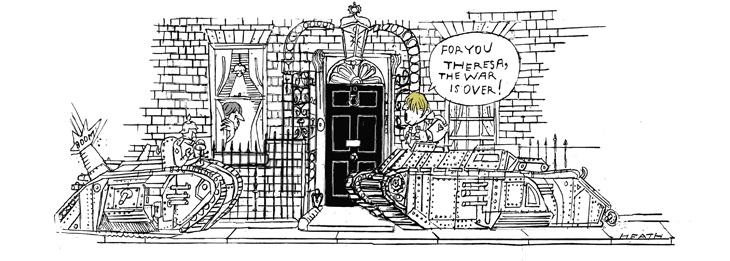Home
Theresa May, the Prime Minister, defended a 500-page technical draft of the agreement on withdrawal from the European Union. She met immediate opposition from the Democratic Unionists, from Jacob Rees-Mogg and from Boris Johnson. Mr Johnson’s brother Jo (a Remainer) had earlier resigned as a minister, calling Mrs May’s handling of Brexit a ‘failure of British statecraft on a scale unseen since the Suez crisis’. The BBC reported that several cabinet ministers had expressed doubts about her Chequers plan back in July. Jeremy Corbyn, the Labour leader, insisted that Brexit could not be stopped, but Keir Starmer, Labour’s shadow Brexit secretary, said the option of a new referendum was still ‘on the table’. Premier Foods put its Ambrosia creamed rice business up for sale as it began to spend £10 million to prepare for Brexit. The Prince of Wales celebrated his 70th birthday.
The nation had spent a weekend solemnly marking the centenary of the Armistice. Big Ben was allowed to strike 11. The Queen closed her eyes in prayer and the Prince of Wales laid a wreath at the Cenotaph. Some people criticised Jeremy Corbyn, for wearing an anorak and a red tie there. Bells rang; poppy petals fell; large engravings of individuals who had died in the first world war were made on beaches and washed away by the tide; silhouettes of the fallen were placed in churches. The government was said to oppose the granting of asylum to Asia Bibi (a Christian acquitted of blasphemy after eight years on death row in Pakistan) for fear of community unrest. Lord Lester of Herne Hill should be suspended from sitting in the Lords until 2022, its Privileges and Conduct Committee said, after he was found to have offered a woman ‘corrupt inducements to sleep with him’ in 2006 by promising her a peerage; he denied the allegations.
The British economy grew by 0.6 per cent in the third quarter and the annual rate of wage increases rose to 3.2 per cent. Inflation remained unchanged at 2.4 per cent. Unemployment rose by 21,000 and the number of people from Cyprus, the Czech Republic, Estonia, Hungary, Latvia, Lithuania, Malta, Poland, Slovakia and Slovenia working in Britain fell by 173,000. The owners of the Daily Mail were said to be interested in buying the i newspaper from Johnston Press. James Brokenshire, the culture secretary, defended Sir Roger Scruton’s appointment as the chairman of a new public body to encourage more beautiful houses; Labour said he should be dumped because in 2007 he wrote in the Daily Telegraph that homosexuality was ‘not normal’. Adam Thomas, 22, and Claudia Patatas, 38, from Banbury, a couple who had given their baby the middle name Adolf, were convicted of belonging to National Action, a banned Neo-Nazi group; a swastika-shaped pastry cutter was found at their home.
Abroad
In events to mark the 100th anniversary of the Armistice, Chancellor Angela Merkel of Germany and President Emmanuel Macron of France signed a book of remembrance in a replica railway carriage near Compiègne. President Donald Trump cancelled his visit to a US military cemetery because it was raining and he wouldn’t be able to use a helicopter. At a ceremony in Paris, President Vladimir Putin of Russia shook him by the hand and gave him a thumbs-up. During a meeting Mr Macron put his hand on Mr Trump’s knee, but later in a speech he said: ‘Patriotism is the exact opposite of nationalism; nationalism is a betrayal of patriotism.’
At least 48 died in wildfires sweeping California and scores were missing. Some 300,000 had to flee their homes. In Paradise, 6,700 homes and businesses burnt down. Thousand Oaks lost scores of houses days after 12 people were shot dead in a bar there by a former US marine who had served in Afghanistan; he is believed to have committed suicide. One of those killed was Telemachus Orfanos, 27, who had escaped death last year when a gunman killed 58 people in Las Vegas.
Palestinian guerrillas in Gaza fired more than 400 rockets into Israel and Israeli aircraft hit 150 targets, killing six people. Turkey sent an audio recording of the killing of the Saudi journalist Jamal Khashoggi to western powers and to Saudi Arabia. Sri Lanka’s Supreme Court suspended the President’s move to dissolve parliament and hold snap elections. A Spanish court ordered the former Catalan leader Artur Mas to repay the €4.9 million costs of organising 2014’s illegal vote on independence. CSH






Comments